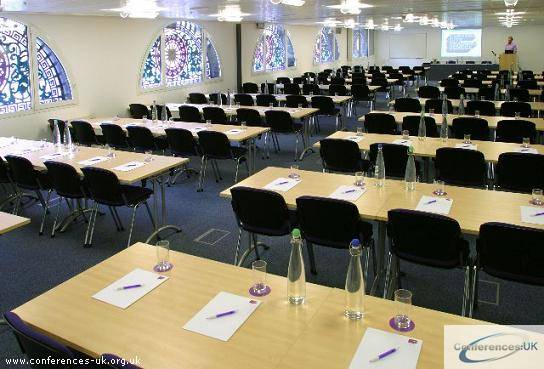From 29 to 31 October, London hosted the 9th World Islamic Economic Forum (WIEF): an international business event organised by the WIEF Foundation whose headquarters are located in Kuala Lumpur, Malaysia. Since the global megalopolis keeps on attracting Muslim millionaires from around the world, the WIEF was another opportunity for the government to remind its commitment to make the new market of Islamic Finance flourish in the city.
The event took place at the ExCel Convention centre in South East London, a few minutes away from the city airport, by the historic royal docks that have made of London one of the most important commercial hubs in the world. The names of the tube stations that ride along the docks: “West Ferry”, “East India”, “Royal Victoria”, are reminders of this ‘glorious’ past, of the time when the East India company served not only to trade goods with the Indian sub-continent, but also worked as a Trojan horse in the British colonial conquest. The West India docks located a bit further up on the Isles of Dogs were built between 1800 and 1802 under the impulse of Robert Milligan, a rich merchant and ship-owner, who had returned to London after having established a plantation for his families in the West Indies. Outraged at losses due to theft and delay at London’s riverside wharves, Milligan headed a group of powerful businessmen who planned and built the West India Docks, lobbying Parliament to allow the creation of a West India Dock Company.
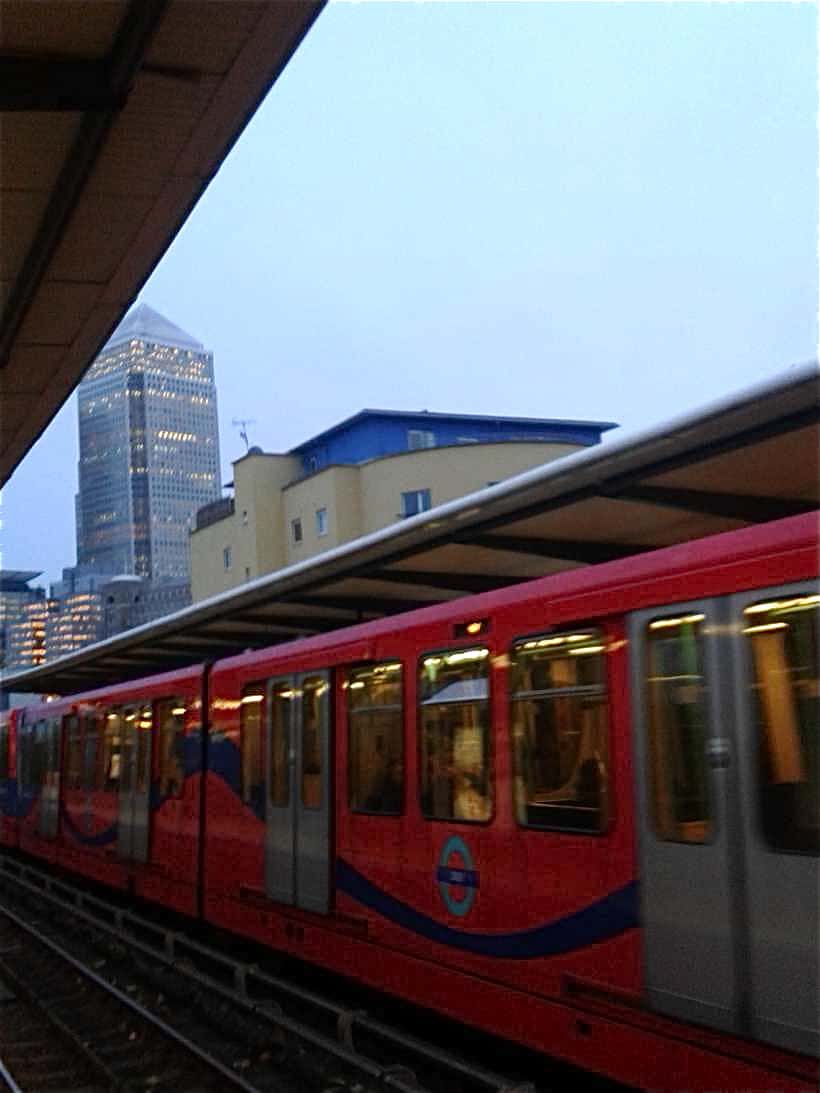 The docks once represented the heart of the Industrial revolution in the early 19th century, when the first factories were installed by the banks of the river to transform into manufactured goods raw materials just arrived on vessels from the colonies. The wealth of London largely relies on the legacy of the triangular trade where guns, cloth, iron and beer from Europe were exchanged against gold, ivory, spice, hardwoods…and slaves from Africa who were then deported to work in plantations in the West Indies and North America.
The docks once represented the heart of the Industrial revolution in the early 19th century, when the first factories were installed by the banks of the river to transform into manufactured goods raw materials just arrived on vessels from the colonies. The wealth of London largely relies on the legacy of the triangular trade where guns, cloth, iron and beer from Europe were exchanged against gold, ivory, spice, hardwoods…and slaves from Africa who were then deported to work in plantations in the West Indies and North America.
The rapid reconversion of the docks during the Thatcher era is another reminder of the recent transformation of capitalism in the neo-liberal age. No more ships or vessels can be seen on the docks: but instead the skyscrapers of Canary Wharf: the new financial quarter of the capital.
But today is not a time to unravel the past. Indeed the Forum is held under the theme: “Changing World, New Relationships”. As the secretary general of WIEF Tan Sri Ahmad Fuzi explains in his address: “High unemployment and slow growth demand for economic transformations. In a fast changing world, the human economy and the financial economy need to be envisioned as equally important.”
With 2700 attendees from 128 countries, 16 heads of state, 33 ministers and CEOs from the biggest companies in the world, Islamic finance experts, scholars and health care executives, the WIEF wants to present itself as a platform where a new framework for business can be collectively defined.
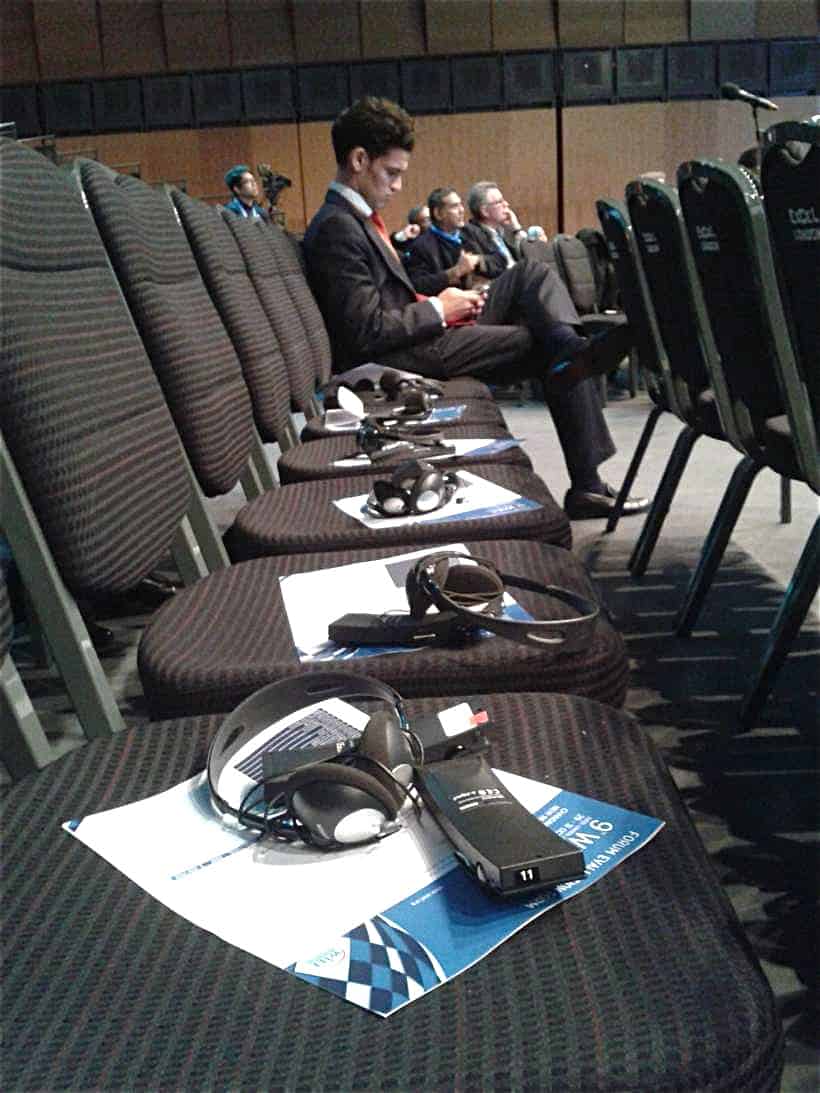 Strangely, I find myself in an environment that reminds me of the UN where I conducted fieldwork some time ago, as a research assistant for Jane Cowan’s project on the Universal Periodic Review. Looking at the global elites in smart business suits all around me, with their blue badges around their necks and their conference bags on their shoulders, I could easily imagine them attending a working group session at Palais des Nations in Geneva. The conference offers similar facilities: all plenary sessions have simultaneous interpretation through SIS devises displayed on the seats. Video projections of speakers are displayed on huge screens at the back of the room. The WIEF website has a download centre where key speeches can be retrieved. A media centre with access to internet, fax, printers and photocopiers is made available to journalists covering the event.
Strangely, I find myself in an environment that reminds me of the UN where I conducted fieldwork some time ago, as a research assistant for Jane Cowan’s project on the Universal Periodic Review. Looking at the global elites in smart business suits all around me, with their blue badges around their necks and their conference bags on their shoulders, I could easily imagine them attending a working group session at Palais des Nations in Geneva. The conference offers similar facilities: all plenary sessions have simultaneous interpretation through SIS devises displayed on the seats. Video projections of speakers are displayed on huge screens at the back of the room. The WIEF website has a download centre where key speeches can be retrieved. A media centre with access to internet, fax, printers and photocopiers is made available to journalists covering the event.
The event is not about human rights, though…but it is about “ethical business”…even if at the moment I write these notes I still wonder what Islamic ethics in business may mean in practice. On one of the brochures of the WIEF, I read that two main objectives of the Forum are “ 1) To package the Muslim World as a lucrative trade and investment caucus that is able to attract foreign investors and business partners from various countries worldwide. 2) To promote dialogue and foster cooperation among the Muslim and non-Muslim businessmen in the belief that collaboration is the salient feature of the 21st century international relations.” There is, indeed, lots of packaging around, from Coca-Cola free distribution of its famous sodas, to Islamic banks displaying animated graphic charts on High-Tech plasma screens.
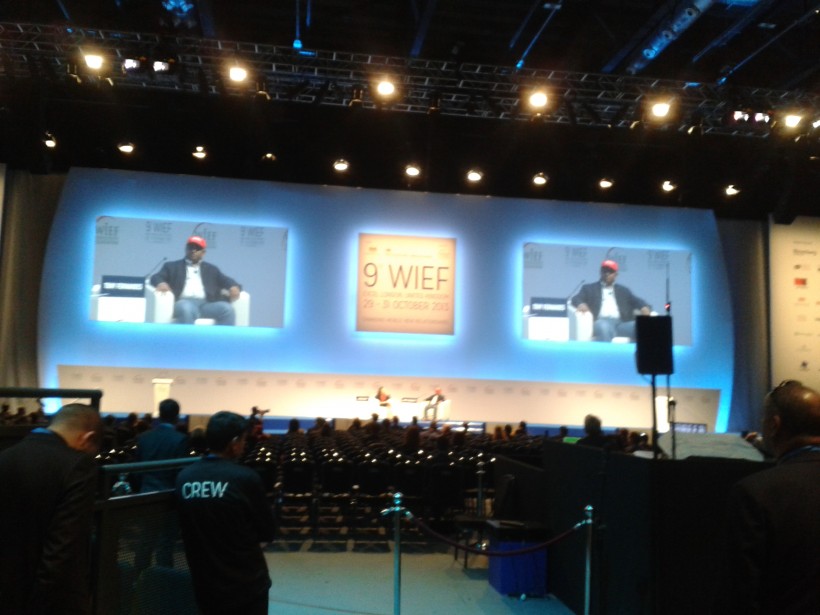 It is now the turn of Tony Fernandes, CEO of Air Asia, to take the floor and explain the secrets behind the fast growth and success of his company. “When it comes to business, you should listen to no-one! If you have an idea, you have to go for it and just do it!”, explains the relaxed Malaysian businessman dressed with jeans and a red cap with his company’s logo firmly glued on his head. ‘Just do it!’ Nike’s slogan as a mantra for Islamic business ethics? I am confused…The reason for the rapid expansion of Air Asia, he says, is that “In Air Asia, we have no ego! Many businesses worry too much about their ego. But when we, at Air Asia, make mistakes, we try and learn from them”. The company, he argues, follows a flat management style, which “allows us to do things unconventionally!” And he uses the example of an uneducated luggage boy who was able to become a pilot within seven years of work in the company.
It is now the turn of Tony Fernandes, CEO of Air Asia, to take the floor and explain the secrets behind the fast growth and success of his company. “When it comes to business, you should listen to no-one! If you have an idea, you have to go for it and just do it!”, explains the relaxed Malaysian businessman dressed with jeans and a red cap with his company’s logo firmly glued on his head. ‘Just do it!’ Nike’s slogan as a mantra for Islamic business ethics? I am confused…The reason for the rapid expansion of Air Asia, he says, is that “In Air Asia, we have no ego! Many businesses worry too much about their ego. But when we, at Air Asia, make mistakes, we try and learn from them”. The company, he argues, follows a flat management style, which “allows us to do things unconventionally!” And he uses the example of an uneducated luggage boy who was able to become a pilot within seven years of work in the company.
I walk around the stalls, trying to understand what halal business culture is about. I feel a bit self-conscious not to be dressed in a suit, like everyone else. Women, in particular, look dashing with their colourful and creatively tied hijabs and high heels. Another important theme of the Forum is ‘women’s entrepreneurship’: a special businesswomen network has been set up ‘to empower women and optimise their potential through economic and business activities”. The network organises regular workshops on online marketing and Small and Medium Enterprises. Apart from one panel on “Women in the corporate world” organised in the ICC auditorium and the conference moderator Nisha Pillai, I have not seen that many women on the podium (even though many are present in the room).
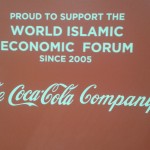 The main conversations, however, are around Islamic Finance. In his inaugural address, David Cameron made it clear that he wanted London to ‘stand along Dubai and Kuala Lumpur as one of the great capitals of Islamic Finance anywhere in the world’. His government has already taken big steps to open up the City of London to more Islamic finance. Today Britain has more banks compliant with the principle of Islamic finance than any other country. Over 25 British law firms supply services in Islamic finance and the offer of education and qualifications in Islamic Finance has dramatically increased over the past few years. The government has already removed the double tax on Islamic mortgages and extended tax relief on Islamic mortgages to companies as well as individuals, and just last week it made new commitments to open up new forms of student loans and business start-up loans for Islamic students and entrepreneurs. The message is clear indeed: Britain wants its share of the growing islamic business.
The main conversations, however, are around Islamic Finance. In his inaugural address, David Cameron made it clear that he wanted London to ‘stand along Dubai and Kuala Lumpur as one of the great capitals of Islamic Finance anywhere in the world’. His government has already taken big steps to open up the City of London to more Islamic finance. Today Britain has more banks compliant with the principle of Islamic finance than any other country. Over 25 British law firms supply services in Islamic finance and the offer of education and qualifications in Islamic Finance has dramatically increased over the past few years. The government has already removed the double tax on Islamic mortgages and extended tax relief on Islamic mortgages to companies as well as individuals, and just last week it made new commitments to open up new forms of student loans and business start-up loans for Islamic students and entrepreneurs. The message is clear indeed: Britain wants its share of the growing islamic business.
Hamad Buamim, CEO of Dubai Chamber of Commerce and Industry, comes forward on the podium. The 10th WIEF will take place in Dubai next year and, like Cameron, he wants to convince everyone that the city-state is best placed to host the convention and to push forward new business opportunities. « I am convinced, he says, that Islamic enterprise is the solution to the world and that it can satisfy both Muslims and non-Muslim consumers. Dubai is strategically located between Asia and Europe. It is a leading international centre for trade, logistics and tourism. It is a leading hub for Islamic economics. » On this, he receives a storm of applause, the lights in the room are lowered, and an advertisement for Dubai appears on the screen. We are shown wild landrover rides in the desert, Pharaonic hotels and entertainment parks, fine restaurants and conference halls…and the ostentatious luxury of mega shopping malls.
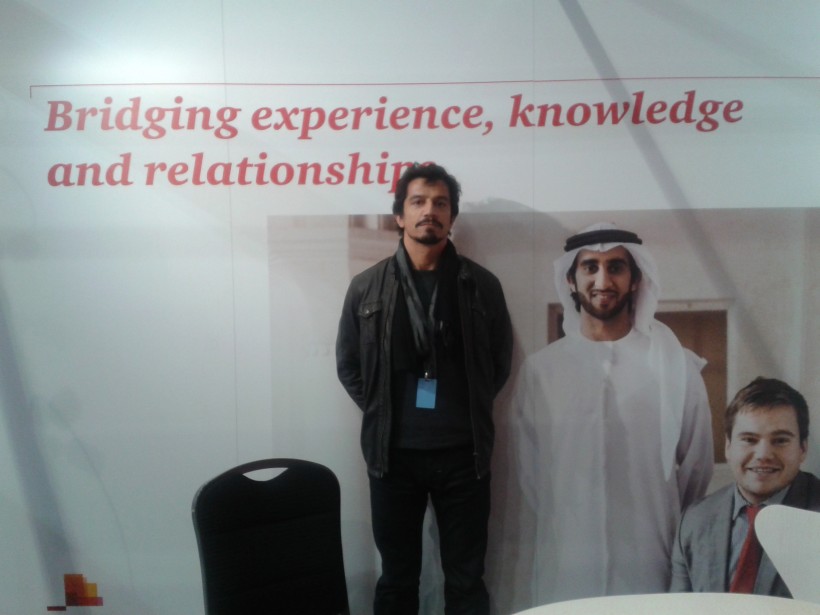 Now comes the turn of the WIEF chairman, Tun Musa Hitam, to deliver his speech. The chairman seems to be on a high (or is it part of the performance?). He shares the view that this is the best Forum he has attended since its creation in 2003. The conversations that the Forum has triggered confirm his intuition that Islamic enterprises can provide concrete solutions to the World economic crisis. “What makes a difference is our interest in the Umma. It’s the common people who really need our attention and the attention of those who are able to provide. We would like to think that we are bottom-up! We need to continue to brainstorm together and think of how the small ones can join the business community! The world is still divided into two: the Islamic world and the rest but we should not allow this to happen. This is the bridge we are trying to build here because the real purpose of business is our common good: development! If we are able to create a strong brand, then we’ll make our products marketable…And once a product is marketable, we can spread and grow!” he emphatically declares.
Now comes the turn of the WIEF chairman, Tun Musa Hitam, to deliver his speech. The chairman seems to be on a high (or is it part of the performance?). He shares the view that this is the best Forum he has attended since its creation in 2003. The conversations that the Forum has triggered confirm his intuition that Islamic enterprises can provide concrete solutions to the World economic crisis. “What makes a difference is our interest in the Umma. It’s the common people who really need our attention and the attention of those who are able to provide. We would like to think that we are bottom-up! We need to continue to brainstorm together and think of how the small ones can join the business community! The world is still divided into two: the Islamic world and the rest but we should not allow this to happen. This is the bridge we are trying to build here because the real purpose of business is our common good: development! If we are able to create a strong brand, then we’ll make our products marketable…And once a product is marketable, we can spread and grow!” he emphatically declares.
Sitting next to me, a woman called Sima hands me her business card. She is working as a fundraiser for an Islamic NGO and she came here to try and build new partnerships with the business community. She tells me that a large part of her NGO’s revenue comes from the private sector especially Islamic wills. I ask her if she was successful. She answers that it has been a bit difficult to identify the right people to talk to. She attended business lunches and seminars, feeling a bit like an ‘outsider’…a feeling to which I can totally relate, being totally new to the ‘business world’.
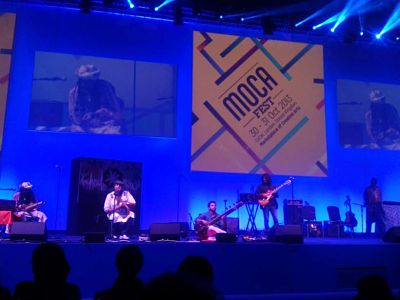 On these words coming ‘from the bottom’, I leave the conference room to find something to grab at the buffet. The 39 artists who are part of the MOCAfest, the World Islamic Economic Forum (WIEF) Foundation’s arts festival, will give their last performance tonight. Among them, I recognise some British Muslim artists I have seen on other occasions: Graffiti artist Mohammed Ali Aerosol Arabic, Spoken word artist Sukina Pilgrim, Hip Hop singers Native Sun, Mohammed Yahya and the band Silk Road. They seem to have become the ‘official’ Muslim artists of the the UK!
On these words coming ‘from the bottom’, I leave the conference room to find something to grab at the buffet. The 39 artists who are part of the MOCAfest, the World Islamic Economic Forum (WIEF) Foundation’s arts festival, will give their last performance tonight. Among them, I recognise some British Muslim artists I have seen on other occasions: Graffiti artist Mohammed Ali Aerosol Arabic, Spoken word artist Sukina Pilgrim, Hip Hop singers Native Sun, Mohammed Yahya and the band Silk Road. They seem to have become the ‘official’ Muslim artists of the the UK!
As Mexican American convert and Hip-Hop singer Marc Gonzales performs a prayer on stage, repeating ‘We will heal ! We will grow ! We will win !’, Mohammed Ali sprays a graffiti on a canvas, with domes of mosques appearing in backlight across the city skyline. It is followed by a performance of British Malaysian singer Saif Adam, whom, we are told, just signed a contract with a new record label. He wears a black jumper with two white diamonds and a moustache printed on the front.
Look inside your heart
Searching for your soul
Mashallah Rasilullah
A mother’s smile Oh Oh Oh
Allah U Akbar
And then I’m strong
Respect your sisters
Mashallah Rasilullah!
These fieldnotes are part of an on-going research on the Islamic legal culture of England. This research, which I started in 2009, aims to capture the new cultural assemblages that have emerged in the European public sphere as a result of the increased visibility of Islam. In my earlier note, I have discussed ‘pink chadors and black niqabs’ (click here to read).




